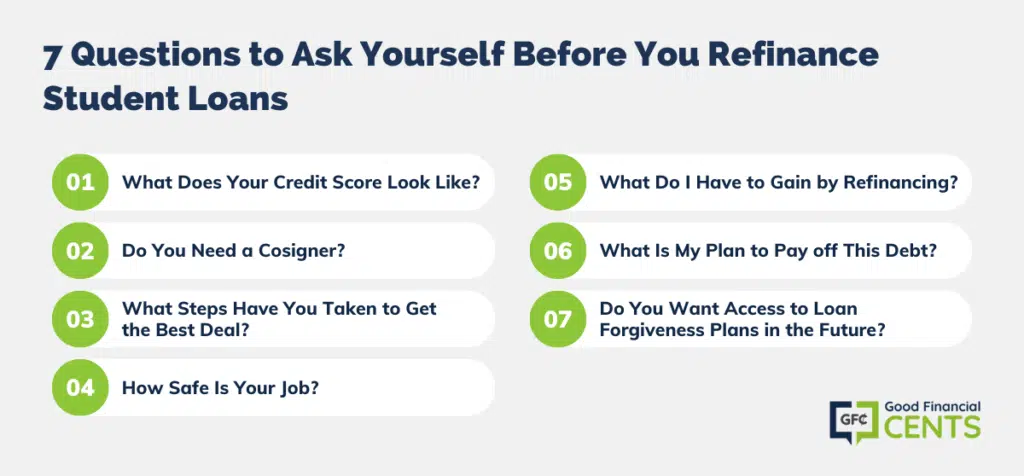Whether you’re unhappy with your student loans or want to know if you can find a better deal, it’s only natural to ask yourself, “Should I refinance my student loans?”
This is a great question, but it’s one that doesn’t have a cut-and-dry answer. There are times when it absolutely makes sense to refinance your student loans, but there are also scenarios where you’d be better off keeping the student loans you have.
Table of Contents
With that in mind, there are some important questions you can and should ask yourself before you move forward. By asking these questions and answering them openly and honestly, you can decide whether to refinance your student loans now, or later, or stick with your current repayment plan.
What Does Your Credit Score Look Like?
Before refinancing your student loans, you should have a general idea of your credit standing. Fortunately, there are free, quick, and easy ways to check your credit score online.
Take note:
If you have a good credit score or a FICO score of 670 or higher, you’ll have a much better chance of getting approved for student loan refinancing. If your credit score is on the low end, however, you may not get approved without some additional help.
Do You Need a Cosigner?
If your credit score isn’t great, having a cosigner with good credit can help you qualify for much better refinance loan rates and terms than you can get on your own.
Ask yourself if someone in your life, such as a spouse, might be willing to cosign to help you get approved or get a better rate.
What Steps Have You Taken to Get the Best Deal?
Take note: you should never go with the first student loan company you come across. Rather, you should always check interest rates and loan fees with different lenders before you apply. This is true for both student loans for school and student loan refinancing products.
Take College Ave Student Loans, for example. They offer refinancing options that can reduce your monthly payments and even the total cost of your loan. Additional benefits include:
- Low Interest Rates
- No Application or Origination Fees
- An Autopay Discount
These are just a few perks to keep in mind as you research potential lenders.
Before you refinance your student loans, however, you should use a free credit pre-qualification tool to gauge your approval odds without a hard inquiry on your credit report. Doing so can help you figure out whether you can qualify for student loan refinancing with or without a cosigner and the type of rate you may qualify for.
How Safe Is Your Job?
Determine how steady your income is before you refinance. If you refinance federal student loans with a private lender, you will lose access to federal income-based repayment and forgiveness options.
Typically, student loan refinancing works best for borrowers who have a stable income and want to repay their loans faster or on their own terms. If your job is shaky or you are worried about losing your income in the near future, it could make sense to hold off on refinancing until your career is in a better place.
What Do I Have to Gain by Refinancing?
Before you refinance, you’ll want to have a strong sense of why. You should mostly stand to gain something substantial from refinancing, whether that be a lower interest rate, a lower total amount of interest charges, a more reasonable monthly payment on your loans, a better repayment plan, or something else.
A good student loan refinance calculator can help you figure out whether refinancing your student loans is right for you. You can even use it to compare your new loan options (including monthly payments and total interest charges) to the loans you have.
What Is My Plan to Pay off This Debt?
Once you have a plan on how to pay off your student loans, you can figure out what kind of repayment plan to look for as you compare student loan companies and what best next steps to take.
Also, determine what kind of monthly payment you can afford as you shop for new loans. This step can help you figure out which loan term will get you the type of monthly payment you’re hoping for.
Do You Want Access to Loan Forgiveness Plans in the Future?
If you have federal student loans, you should consider whether you have the potential to qualify for student loan debt forgiveness in the future. After all, forgiveness plans like Public Service Loan Forgiveness (PSLF) and Teacher Loan Forgiveness only apply to federal student loans.
The same is true for income-driven repayment plans, which let you pay a percentage of your discretionary income for 20 to 25 years before having your remaining student debts forgiven.
If you are angling for forgiveness through one of these plans, you may want to keep any federal student loans you have instead of refinancing. On the flipside, refinancing can make sense if you are on a path to pay off your loans over a standard timeline and you want a lower interest rate, a better monthly payment, or both.

The Bottom Line
Refinancing your student loans is a big step to take. Especially if you have federal student loans, you need to ensure that it’s the right move for you — and one that will yield benefits for years to come.
Remember, no one is going to ask you to refinance your student loans – you’ll have to research and plan yourself if you want to make it happen. Fortunately, online student loan companies like College Ave Student Loans make it easy to check your rate and your approval odds before you apply.







